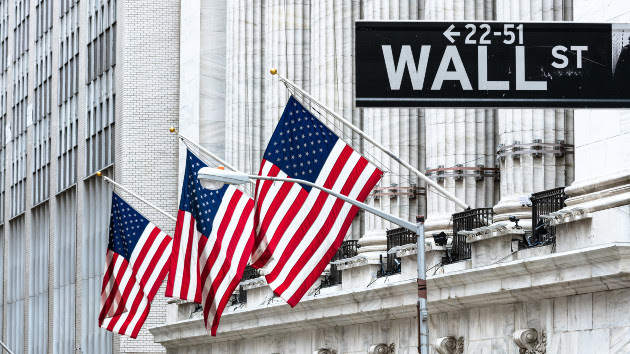
(NEW YORK) — The U.S. could breach the debt ceiling as soon as next week, plunging the stock market by nearly half if a protracted default ensues, according to a White House projection.
Stock investors, however, don’t seem worried — at least for now. All of the major stock indices have inched upward over the past five days, defying alarm of a potential economic cataclysm.
Investors are confident that policymakers will reach a deal on either a comprehensive agreement or a stop-gap measure that averts a debt ceiling breach, market analysts told ABC News.
If the White House and Congress fail to make significant progress this week, the uncertainty will put stress on the stock market, they added.
“It would be a mess,” Ed Moya, a senior market analyst at broker OANDA, told ABC News. “If we don’t get a deal before the weekend, I think everyone will be paying close attention.”
A stock market plunge would significantly erode the retirement savings of many Americans, since investors often peg 401(k) accounts to the S&P 500.
Failure to raise the debt ceiling would send financial markets into turmoil, raise interest rates at a moment when elevated borrowing costs already weigh on economic activity and all but ensure a recession.
Nine days remain before the June 1 deadline — the date when the U.S. could fail to pay its bills, said Treasury Secretary Janet Yellen.
Yellen reiterated that concern in a letter to congressional leaders on Monday, describing it as “highly likely” that the Treasury will run out of money in early June.
In a closed-door meeting with House Republicans Tuesday morning, Speaker Kevin McCarthy told his conference he and the White House are “nowhere a deal” on the debt limit and spending, urging members to hold firm, sources told ABC News.
Still, investors appear to believe that policymakers will strike a deal, with many drawing comfort from the outcome of an acrimonious debt ceiling fight in 2011 that resulted in a bipartisan agreement at the final hour, experts said.
“The underlying assumption is that they will manage to pass some last-minute agreement — pulling out of the same playbook as 2011,” Gregory Daco, chief economist at accounting firm Ernst & Young, told ABC News.
The dispute in 2011 caused the S&P 500 to fall more than 16% before lawmakers reached a deal. Within two months, the market had rallied to the same level where it stood before the drop.
The resolve of investors may stem in part from the expectation that an eventual market downturn would be reversible, Callie Cox, an investment analyst at financial services company eToro, told ABC News.
“It might just be a situation like ripping a Band-Aid off,” Cox said. “It hurts a little bit and prices rally after that.”
Analysts cautioned, however, that the market downturn in the event of an unprecedented debt ceiling breach would be significant, leaving stock performance afterward uncertain even if lawmakers quickly strike a deal.
Due to the severity of that risk, the market will likely show signs of downward pressure in the coming days as confidence in policymakers starts to wobble, they said.
“The next couple days, if there is no progress or if we hit a major roadblock, then we will probably start to see more stress,” said Moya. “We’ll start to see the market 1% down and that could grow to 2% or 3%.”
“If we do breach the debt ceiling, if we are unable to avoid default, I think the immediate price reaction would be a bear market plunge of 20%,” Moya added.
In fact, an initial drop in the stock market could help push policymakers toward a deal, placing investors in a staring contest with those brokering an agreement, Keith Lerner, co-chief investment officer and chief market strategist at Truist Advisory Services, told ABC News.
“Recently these things have come down to the wire and the market starts moving and it forces the politicians to act,” Lerner said. “Right now, the market isn’t putting too much pressure on the politicians.”
Investors expect the White House and Congress to come through in raising the debt ceiling, Lerner added.
“Most of the time we raise the debt ceiling and move on with our lives,” he said.
Copyright © 2023, ABC Audio. All rights reserved.





